牛顿的一生【英文】
牛顿简介英文版
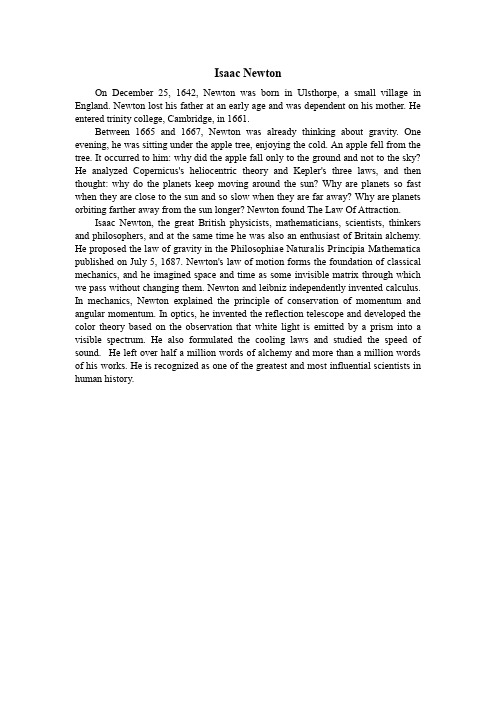
Isaac NewtonOn December 25, 1642, Newton was born in Ulsthorpe, a small village in England. Newton lost his father at an early age and was dependent on his mother. He entered trinity college, Cambridge, in 1661.Between 1665 and 1667, Newton was already thinking about gravity. One evening, he was sitting under the apple tree, enjoying the cold. An apple fell from the tree. It occurred to him: why did the apple fall only to the ground and not to the sky? He analyzed Copernicus's heliocentric theory and Kepler's three laws, and then thought: why do the planets keep moving around the sun? Why are planets so fast when they are close to the sun and so slow when they are far away? Why are planets orbiting farther away from the sun longer? Newton found The Law Of Attraction.Isaac Newton, the great British physicists, mathematicians, scientists, thinkers and philosophers, and at the same time he was also an enthusiast of Britain alchemy. He proposed the law of gravity in the Philosophiae Naturalis Principia Mathematica published on July 5, 1687. Newton's law of motion forms the foundation of classical mechanics, and he imagined space and time as some invisible matrix through which we pass without changing them. Newton and leibniz independently invented calculus. In mechanics, Newton explained the principle of conservation of momentum and angular momentum. In optics, he invented the reflection telescope and developed the color theory based on the observation that white light is emitted by a prism into a visible spectrum. He also formulated the cooling laws and studied the speed of sound. He left over half a million words of alchemy and more than a million words of his works. He is recognized as one of the greatest and most influential scientists in human history.。
_近代科学之父牛顿英语介绍
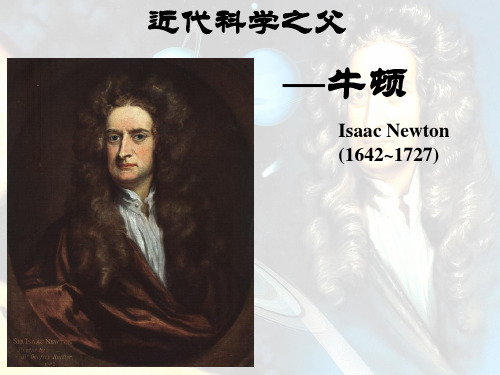
.
.
•
2 Newton almost became a farmer . Newton was born in a farming family. When he was 17 years old, her mother insisted on Newton comes home from school to do farm work. Thank goodness, Newton was not good at farm work. Not a
牛顿在中学时代学习成绩并不出众,但对自然现象有好奇心,尤其是几何学、哥白尼的日心说 等等。他还分门别类的记读书笔记,喜欢做些小试验。
Later ,his mother asked Newton to leave school and work on their farm to support their family. But Newton would devote himself whenever possible. When his mother told him to learn the work of business, he hided in the bushes in order to read a book. On one occasion, his uncle found that his nephew lying on the grass, concentrating on study of a mathematical problem. his uncle was moved, then he persuaded Newton’s mother to let Newton return school, and encourages Newton to go to university. Newton returned to school to study again
介绍牛顿的英语作文
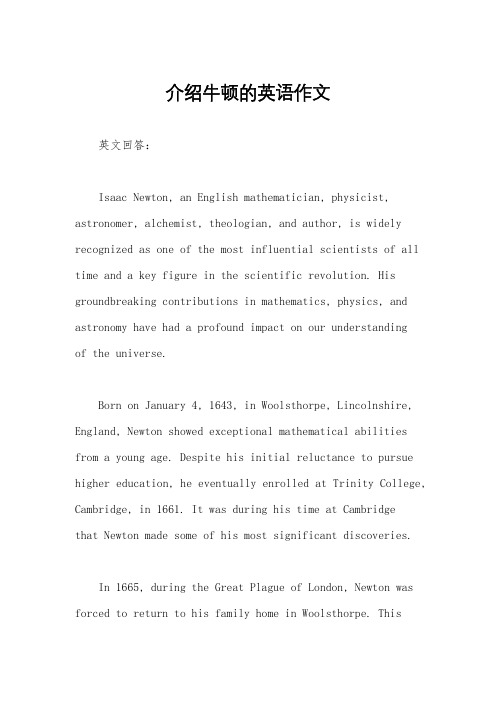
介绍牛顿的英语作文英文回答:Isaac Newton, an English mathematician, physicist, astronomer, alchemist, theologian, and author, is widely recognized as one of the most influential scientists of all time and a key figure in the scientific revolution. His groundbreaking contributions in mathematics, physics, and astronomy have had a profound impact on our understandingof the universe.Born on January 4, 1643, in Woolsthorpe, Lincolnshire, England, Newton showed exceptional mathematical abilities from a young age. Despite his initial reluctance to pursue higher education, he eventually enrolled at Trinity College, Cambridge, in 1661. It was during his time at Cambridgethat Newton made some of his most significant discoveries.In 1665, during the Great Plague of London, Newton was forced to return to his family home in Woolsthorpe. Thisperiod of isolation proved to be highly productive for Newton, and it was during this time that he developed his fundamental laws of motion and universal gravitation. These groundbreaking theories laid the foundation for classical mechanics and celestial mechanics, and they continue to be essential components of modern physics.After returning to Cambridge in 1667, Newton published his seminal work "Philosophiæ Naturalis Principia Mathematica" (Mathematical Principles of Natural Philosophy) in 1687. This masterpiece presented his three laws ofmotion and his law of universal gravitation, whichexplained the motion of celestial bodies and provided a unified framework for understanding the physical world.Newton's contributions to mathematics were equally significant. He developed the calculus, a powerful mathematical tool that revolutionized the fields of mathematics and physics. He also made importantcontributions to the study of optics, including his discovery of the composition of white light and the development of the reflecting telescope.Besides his scientific achievements, Newton was also deeply interested in theology and alchemy. He wrote extensively on biblical interpretation and the existence of God. Newton's religious beliefs influenced his scientific work, and he saw his discoveries as evidence of the harmony and order of the universe.Throughout his life, Newton received numerous honors and accolades for his scientific contributions. He was knighted by Queen Anne in 1705 and served as President of the Royal Society from 1703 to 1727.Isaac Newton's legacy is immense. His groundbreaking discoveries in mathematics, physics, and astronomy laid the foundation for modern science, and his ideas continue to inspire and challenge scientists to this day. His name remains synonymous with scientific genius and his contributions to the advancement of human knowledge are immeasurable.中文回答:牛顿简介。
牛顿英语作文介绍

Isaac Newton: The Genius WhoRevolutionized ScienceIsaac Newton, a name synonymous with scientific revolution, revolutionized the field of physics with his laws of motion and gravity. Born in 1643, Newton was a prodigy from a young age, demonstrating an exceptional understanding of mathematics and science. His journey to becoming one of the greatest scientists of all time began with his curiosity and dedication to understanding the natural world.Newton's life was not always smooth sailing. He experienced significant personal losses, including the death of his mother when he was just three years old and his father soon after. These tragedies left him in the care of his grandparents, who recognized his intellectual abilities and encouraged him to pursue his studies.Newton's breakthrough moment came when he developed his three laws of motion, which form the foundation ofclassical mechanics. These laws describe how objects move and interact with forces, providing a mathematicalframework to understand the motion of objects in thephysical world.His laws of motion were followed by his theory of gravity, which explained the force that attracts objects towards each other. Newton's law of gravity states that every mass attracts every other mass with a force proportional to their masses and inversely proportional to the square of the distance between them. This theory revolutionized our understanding of the universe,explaining phenomena such as planetary motion and the tides. Newton's contributions to science did not end there. He also made significant contributions to the fields of optics, calculus, and astronomy. His work on optics led to the development of the reflecting telescope, while his development of calculus provided a new mathematical toolfor scientists to study change and motion.Despite his many achievements, Newton remained humble and dedicated to his research. He was a firm believer inthe importance of experimentation and observation, stating that "hypotheses non fingo" (I do not feign hypotheses).This dedication to scientific method and rigorous thinking has left a lasting impact on the scientific community.Isaac Newton's life and work serve as an inspiration to scientists and researchers around the world. His legacy is not just in his laws and theories, but in his dedication to understanding the natural world through rigorous experimentation and observation. His impact on science and human understanding remains felt today, more than 300 years after his death.**艾萨克·牛顿:科学革命的天才**艾萨克·牛顿,一个与科学革命同名的名字,以其运动定律和万有引力定律彻底改变了物理学领域。
牛顿的一生英语小作文

牛顿的一生英语小作文Sir Isaac Newton was one of the most influential scientists in history. Born in 1642 in Woolsthorpe Manor, Lincolnshire, England, he made significant contributions to the fields of physics, mathematics, astronomy, and natural philosophy. His groundbreaking work laid the foundation for our modern understanding of the physical world.Newton's early life was marked by adversity. His father, also named Isaac Newton, died before he was born, and his mother remarried when he was just three years old, leaving him in the care of his grandmother. Despite these challenges, Newton showed a keen intellect from a young age, excelling in his studies and demonstrating a natural aptitude for problem-solving.As a young man, Newton attended the prestigious Trinity College, Cambridge, where he would go on to make some of his most remarkable discoveries. It was during his time at Cambridge that he developed his revolutionary theories on the nature of light, optics, and the laws of motion. His work on the laws of motion, which describe the relationship between an object's motion and the forcesacting upon it, would become the foundation of classical mechanics.One of Newton's most famous contributions to science was his work on the theory of gravity. In 1666, while observing an apple fall from a tree, Newton had a eureka moment and realized that the same force that pulled the apple to the ground must also be responsible for the motion of the planets and other celestial bodies. This insight led him to formulate his law of universal gravitation, which states that every particle in the universe attracts every other particle with a force that is directly proportional to the product of their masses and inversely proportional to the square of the distance between them.Newton's work on gravity not only explained the motion of the planets but also provided a unified theory of the physical world. His groundbreaking ideas were met with both enthusiasm and skepticism, but over time, his theories were widely accepted and became the foundation of modern physics.In addition to his work on physics and astronomy, Newton made significant contributions to the field of mathematics. He is credited with developing the branch of mathematics known as calculus, which revolutionized the way we understand and describe the natural world. His work on calculus, along with his contributions to the fields of optics and mechanics, earned him a reputation as one of the greatest scientists of all time.Despite his immense accomplishments, Newton's personal life was not without its challenges. He was known to be reclusive and introverted, and he struggled with mental health issues throughout his life. He was also embroiled in several bitter feuds with other scientists, including the famous dispute with German mathematician Gottfried Leibniz over the invention of calculus.Despite these personal struggles, Newton's impact on the world of science cannot be overstated. His work has had a lasting influence on our understanding of the physical world, and his contributions have paved the way for countless scientific advancements. Today, he is widely regarded as one of the most important figures in the history of science, and his legacy continues to inspire and captivate people around the world.In conclusion, Sir Isaac Newton's life and work have had a profound impact on our understanding of the physical world. From his groundbreaking theories on the laws of motion and the nature of gravity to his contributions to the field of mathematics, Newton's legacy as one of the greatest scientists of all time is secure. Despite the challenges he faced throughout his life, his unwavering dedication to scientific inquiry and his remarkable intellect have left an indelible mark on the course of human history.。
牛顿的简介作文英文

牛顿的简介作文英文Isaac Newton was a famous scientist and mathematician. He was born in 1642 in England and is best known for his work on the laws of motion and universal gravitation. Newton's work laid the foundation for classical mechanics and his book "Philosophiæ Naturalis Principia Mathematica" is one of the most influential books in the history of science.Newton made several important discoveries during his lifetime. He developed the three laws of motion, which describe the relationship between a body and the forces acting on it. He also formulated the law of universal gravitation, which states that every particle of matter in the universe attracts every other particle with a forcethat is directly proportional to the product of their masses and inversely proportional to the square of the distance between their centers.In addition to his work in physics, Newton also madesignificant contributions to mathematics. He is creditedwith the development of calculus, along with German mathematician Gottfried Wilhelm Leibniz. Newton's work in mathematics and physics revolutionized the way weunderstand the natural world and laid the groundwork for many future scientific discoveries.Newton's impact on the scientific community was immense, and his work continues to influence scientists and mathematicians to this day. He was knighted by Queen Annein 1705 and spent the later years of his life as the president of the Royal Society, where he continued to make important contributions to scientific research and scholarship.Newton's legacy is one of innovation and discovery. His work in physics and mathematics has had a lasting impact on the way we understand the natural world, and his ideas continue to be studied and celebrated by scientists and scholars around the world. Isaac Newton will always be remembered as one of the greatest scientific minds in history.。
英语牛顿传记小作文

英语牛顿传记小作文英文回答:Isaac Newton, one of the most influential scientists of all time, was born on January 4, 1643, in Woolsthorpe, Lincolnshire, England. He was a physicist, mathematician, astronomer, alchemist, theologian, and author who is widely recognized as one of the greatest minds in history.Newton's early life was marked by tragedy and hardship. His father died three months before he was born, and his mother remarried when Newton was three years old, leaving him in the care of his maternal grandmother. Newton was a sickly child and often suffered from headaches anddigestive problems.Despite his early challenges, Newton showed an early aptitude for mathematics and science. He attended Trinity College, Cambridge, where he studied mathematics and natural philosophy. After graduating, he remained atCambridge as a fellow and lecturer.In 1665, the Great Plague of London forced Newton to leave Cambridge and return to his home in Woolsthorpe. It was during this period of isolation that Newton made some of his most important discoveries. He developed his theory of calculus, the laws of motion, and the law of universal gravitation.Newton's theory of calculus was a revolutionary new mathematical tool that allowed scientists to solve complex problems involving motion and change. His laws of motion described the relationship between an object's mass, velocity, and acceleration. The law of universal gravitation explained the attraction between any two objects in the universe.Newton's discoveries had a profound impact on the development of science. His work laid the foundation for classical mechanics, which dominated physics for over two centuries. His theories also provided a new understanding of the universe and its laws.In 1687, Newton published his seminal work, "Principia Mathematica," which contained his three laws of motion and the law of universal gravitation. This book is considered one of the most important scientific works ever written.In addition to his scientific work, Newton also made significant contributions to alchemy, theology, and politics. He served as a Member of Parliament for several years and was Master of the Royal Mint from 1696 until his death in 1727.Isaac Newton was a brilliant scientist whose discoveries revolutionized our understanding of the universe. His work has had a lasting impact on science and technology and continues to inspire scientists and engineers today.中文回答:艾萨克·牛顿,史上极有影响力的科学家之一,1643 年 1 月4 日出生于英格兰林肯郡伍尔索普。
英语牛顿传记小作文

英语牛顿传记小作文英文回答:Sir Isaac Newton, an English mathematician, physicist, astronomer, alchemist, theologian, and author who lived from 1642 to 1727, is widely recognized as one of the most influential scientists of all time and a key figure in the scientific revolution. He is best known for his discovery of the laws of motion and universal gravitation, which laid the foundation for classical mechanics. Newton's work also had a profound impact on the fields of mathematics, optics, and astronomy.Born in Woolsthorpe, Lincolnshire, Newton was a precocious child who showed an early aptitude for mathematics and science. He attended Trinity College, Cambridge, where he studied under Isaac Barrow. In 1665, during the Great Plague of London, Newton returned to Woolsthorpe, where he made some of his most important discoveries. It was during this period that he developedhis theory of calculus, investigated the laws of motion, and formulated his law of universal gravitation.In 1687, Newton published his seminal work, "Principia Mathematica," which revolutionized the understanding of the laws of motion and gravity. The book presented Newton's three laws of motion and his law of universal gravitation, providing a comprehensive framework for understanding the behavior of physical objects. "Principia Mathematica" had a profound influence on the development of physics and astronomy, and it remains a cornerstone of classical mechanics to this day.Newton's contributions to mathematics were also significant. He developed a method of calculus that allowed mathematicians to solve complex problems involving continuous change. He also made important contributions to the study of optics, including the discovery of the composition of white light and the development of the reflecting telescope.Newton's work extended beyond the realm of science. Hewas a devout Christian and wrote extensively on religious topics. His theological writings explored the relationship between science and religion, arguing that the laws of nature were evidence of God's design.Newton's legacy continues to inspire scientists, mathematicians, and scholars today. His work laid the foundation for much of modern science, and his discoveries have had a profound impact on our understanding of the universe. He is widely regarded as one of the greatest scientists of all time, and his contributions to scienceand mathematics have shaped the world in which we live.中文回答:艾萨克·牛顿爵士(Sir Isaac Newton)是一位英国数学家、物理学家、天文学家、炼金术士、神学家和作家,他生活在 1642年至 1727 年间,被广泛认为是有史以来最有影响力的科学家之一,也是科学革命中的关键人物。
牛顿介绍英语作文

牛顿介绍英语作文Introduction to Newton。
Isaac Newton is one of the most famous scientists in history. He is best known for his laws of motion and universal gravitation, which revolutionized our understanding of the natural world. In this article, we will explore the life and achievements of this remarkable man.Early Life and Education。
Isaac Newton was born in 1642 in Woolsthorpe, England. His father died before he was born, and his mother remarried when he was three years old. Newton was sent to live with his grandmother, where he developed an early interest in mechanics and the natural world.At the age of 18, Newton went to study at Trinity College, Cambridge. He was an outstanding student andquickly became interested in mathematics and physics. He read works by Galileo, Descartes, and other leading scientists of the time, which inspired him to pursue his own research.Scientific Achievements。
英语作文介绍牛顿

英语作文介绍牛顿Isaac Newton was a brilliant scientist and mathematician who made significant contributions to the fields of physics and mathematics. He is best known for his laws of motion and universal gravitation, which laid the foundation for classical mechanics.Born in 1643 in England, Newton grew up to become a curious and inquisitive individual. He attended Cambridge University, where he developed a keen interest in mathematics and natural philosophy. It was during this time that he began to conduct experiments and make observations that would later shape his groundbreaking theories.One of Newton's most famous works is his book "Philosophiæ Naturalis Principia Mathematica," in which he presented his laws of motion and the law of universal gravitation. These laws revolutionized the way we understand the physical world and laid the groundwork for modern physics.In addition to his work in physics, Newton also made significant contributions to the field of mathematics. Heis credited with the development of calculus, a branch of mathematics that is essential for understanding the laws of motion and for solving complex scientific problems.Newton's legacy continues to inspire and influence scientists and mathematicians to this day. His work has had a profound impact on our understanding of the natural world and has paved the way for countless scientific advancements. Isaac Newton will always be remembered as one of thegreatest minds in the history of science.。
介绍牛顿的一生英语作文
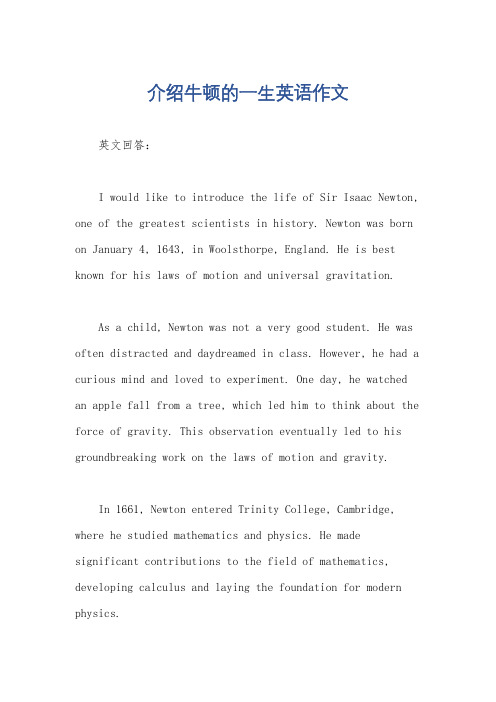
介绍牛顿的一生英语作文英文回答:I would like to introduce the life of Sir Isaac Newton, one of the greatest scientists in history. Newton was born on January 4, 1643, in Woolsthorpe, England. He is best known for his laws of motion and universal gravitation.As a child, Newton was not a very good student. He was often distracted and daydreamed in class. However, he had a curious mind and loved to experiment. One day, he watched an apple fall from a tree, which led him to think about the force of gravity. This observation eventually led to his groundbreaking work on the laws of motion and gravity.In 1661, Newton entered Trinity College, Cambridge, where he studied mathematics and physics. He made significant contributions to the field of mathematics, developing calculus and laying the foundation for modern physics.One of Newton's most famous works is his book "Philosophiæ Naturalis Principia Mathematica," where he outlined his laws of motion and universal gravitation. These laws revolutionized the way we understand the physical world and are still used today in physics and engineering.Despite his genius, Newton was known to be a reclusive and eccentric man. He had a fierce temper and often clashed with his colleagues. However, his contributions to science are undeniable, and he is considered one of the most influential scientists of all time.中文回答:我想介绍一下艾萨克·牛顿爵士的一生,他是历史上最伟大的科学家之一。
介绍牛顿的一生英语作文
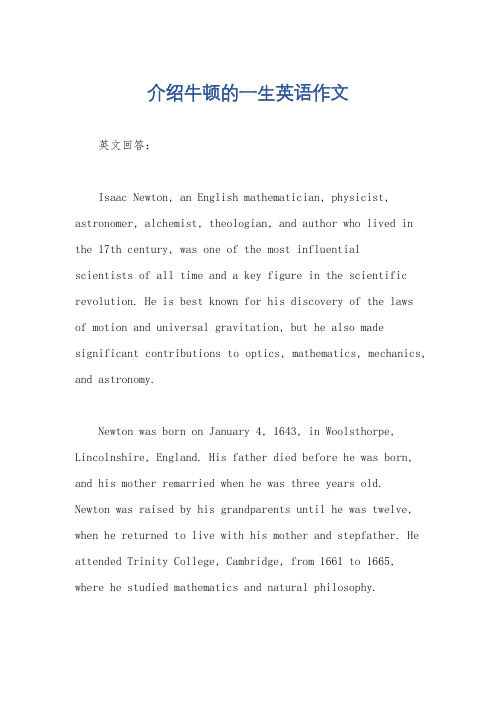
介绍牛顿的一生英语作文英文回答:Isaac Newton, an English mathematician, physicist, astronomer, alchemist, theologian, and author who lived in the 17th century, was one of the most influentialscientists of all time and a key figure in the scientific revolution. He is best known for his discovery of the lawsof motion and universal gravitation, but he also made significant contributions to optics, mathematics, mechanics, and astronomy.Newton was born on January 4, 1643, in Woolsthorpe, Lincolnshire, England. His father died before he was born, and his mother remarried when he was three years old. Newton was raised by his grandparents until he was twelve, when he returned to live with his mother and stepfather. He attended Trinity College, Cambridge, from 1661 to 1665, where he studied mathematics and natural philosophy.In 1665, the Great Plague of London forced Newton to return home to Woolsthorpe. During this time, he developed his theory of calculus, which he called "the method of fluxions." He also made significant progress on his theory of universal gravitation, which he published in his Principia Mathematica in 1687.In 1669, Newton was appointed Lucasian Professor of Mathematics at Cambridge. He held this position until 1701, when he was appointed Master of the Royal Mint. He served in this role until his death in 1727.Newton was a prolific writer, and his works include the Principia Mathematica, the Opticks, and the Method of Fluxions. He was also a devout Christian, and he wrote extensively on religious topics.Newton died on March 20, 1727, in London. He was buried in Westminster Abbey.中文回答:艾萨克·牛顿,是一位生活在17世纪的英国数学家、物理学家、天文学家、炼金术士、神学家和作家,他是当时最具影响力的科学家之一,也是科学革命的关键人物。
Newton 牛顿 英文介绍
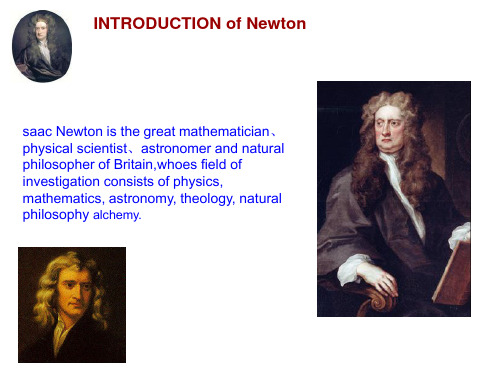
The main contributions of Newton
1、The invention of calculus
2、the discovery of gravitational theory and classic mechanics
3、Optics ①、the designer an the inventor of the first type of catoptric telescope ②、discovered the princinple of optical dispersion
French mathematician Joseph-Louis Lagrange often said that Newton was the greatest genius who ever lived, and once added that Newton was also "the most fortunate, for we cannot find more than once a system of the world to establish Newton himself had been rather more modest of his own achievements, famously writing in a
From this work, he concluded that the lens of any refracting telescope would suffer from the dispersion of light into colours (chromatic aberration).
Fame
3、Optics
He also showed that the coloured light does not change its properties by separating out a coloured beam and shining it on various objects. Newton noted that regardless of whether it was reflected or scattered or transmitted, it stayed the same colour. Thus, he observed that colour is the result of objects interacting with already-coloured light rather than objects generating the colour themselves. This is known as Newton's theory of colour.
牛顿介绍_英文
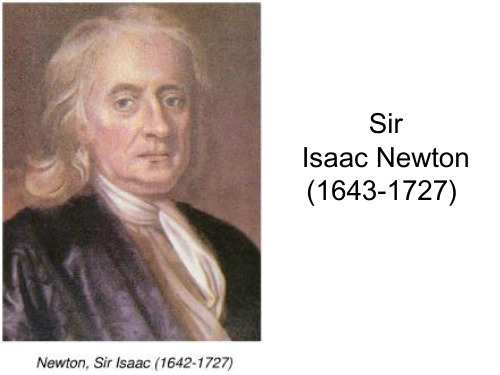
Sir Isaac Newton (1643-1727)
• One day, Newton was reading under an apple tree.
• Suddenly, an apple fell down.
• Newton was born in1643. He grew up in the English countryside. • From the very first Newton was very much interested in the mysteries of nature. • One of the most difficult scientific problems of Newton's day was about the question of motion. Why did objects move?.
• Newton was the greatest mathematician and physicist in the world.
• When did Newton born? • Where did Newton from? • Which university did he in?
He thought, -Why the apple fell down? -Whether anything will also fall down or not? - Will the sun, the moon and stars fall down, too? After a lot of experiments, Newton finally found the Law of w the story of Newton and the falling apple. • But do you know what kind of man this great scientist was? • Where he stands in the history of science?.
牛顿介绍英语作文

牛顿介绍英语作文Sir Isaac Newton, one of the greatest scientists in history, was born on January 4, 1643, in Woolsthorpe, England. He made significant contributions to the fields of physics, mathematics, and astronomy, and his work laid the foundation for much of modern science.Newton's early life was marked by hardship and struggle. His father died before he was born, and his motherremarried when he was three years old, leaving him in the care of his grandmother. Despite these challenges, Newton showed an early aptitude for learning and was eventually sent to the University of Cambridge, where he studied mathematics and science.It was during his time at Cambridge that Newton beganto develop his groundbreaking theories. In 1665, when the university was closed due to an outbreak of the plague, Newton returned to Woolsthorpe and spent the next two years conducting experiments and formulating his ideas. It wasduring this period that he made some of his most important discoveries, including his work on the laws of motion and the theory of universal gravitation.In 1687, Newton published his most famous work, "Philosophiæ Naturalis Principia Mathematica," in which he laid out his three laws of motion and the law of universal gravitation. This work revolutionized our understanding of the natural world and laid the groundwork for much of modern physics.In addition to his work in physics, Newton also made significant contributions to the field of mathematics. Heis credited with the development of calculus, a branch of mathematics that is widely used in science and engineering.Newton's work had a profound impact on the scientific community and earned him numerous accolades and honors. In 1703, he was elected president of the Royal Society, a position he held until his death. He was also knighted by Queen Anne in 1705, in recognition of his contributions to science.Newton's legacy continues to be felt to this day. His laws of motion and theory of universal gravitation form the basis of classical mechanics, and his work in mathematics laid the foundation for much of modern calculus. He is widely regarded as one of the most influential scientistsin history, and his work continues to inspire and inform scientific research to this day.In conclusion, Sir Isaac Newton was a brilliant and innovative scientist whose work revolutionized our understanding of the natural world. His contributions to the fields of physics, mathematics, and astronomy continue to have a lasting impact, and his legacy will continue to inspire scientists and researchers for generations to come.。
牛顿的生平及成就英文简介
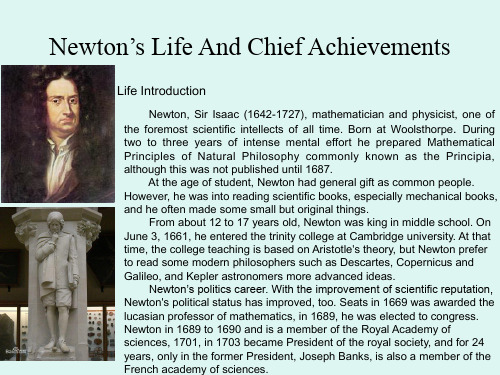
In Optics
The publication of Optics, largely written by 1692, was delayed by Newton until the critics were dead. The book was still imperfect: the colors of diffraction defeated Newton. Nevertheless, Optics established itself, from about 1715, as a model of the interweaving of theory with quantitative experimentation .
Newton’s Life And Chief Achievements
Life Introduction
Newton, Sir Isaac (1642-1727), mathematician and physicist, one of the foremost scientific intellects of all time. Born at Woolsthorpe. During two to three years of intense mental effort he prepared Mathematical Principles of Natural Philosophy commonly known as the Principia, although this was not published until 1687. At the age of student, Newton had general gift as common people. However, he was into reading scientific books, especially mechanical books, and he often made some small but original things. From about 12 to 17 years old, Newton was king in middle school. On June 3, 1661, he entered the trinity college at Cambridge university. At that time, the college teaching is based on Aristotle's theory, but Newton prefer to read some modern philosophers such as Descartes, Copernicus and Galileo, and Kepler astronomers more advanced ideas. Newton’s politics career. With the improvement of scientific reputation, Newton's political status has improved, too. Seats in 1669 was awarded the lucasian professor of mathematics, in 1689, he was elected to congress. Newton in 1689 to 1690 and is a member of the Royal Academy of sciences, 1701, in 1703 became President of the royal society, and for 24 years, only in the former President, Joseph Banks, is also a member of the French academy of sciences.
